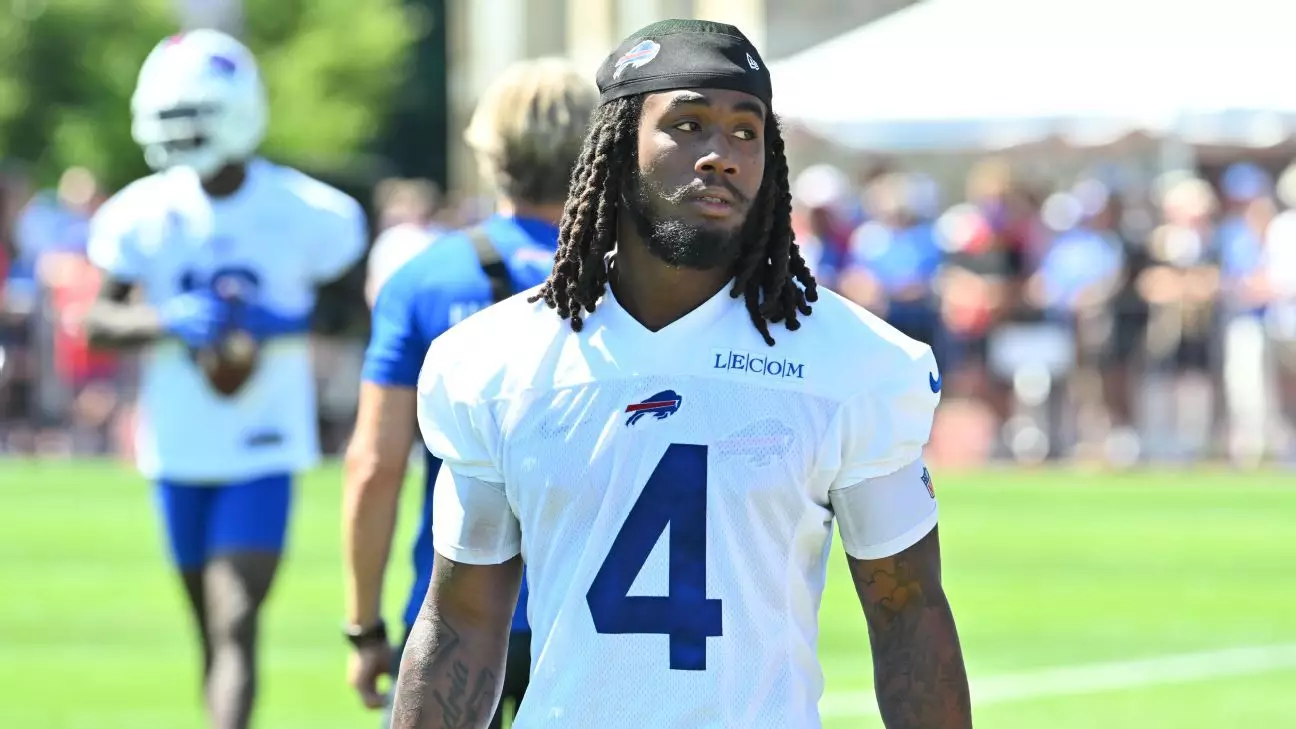In the high-stakes world of professional football, players often find themselves caught between ambition and negotiation, striving to secure what they believe they deserve. James Cook, the dynamic running back for the Buffalo Bills, exemplifies this relentless pursuit. His public declarations for a $15 million per year contract highlight not only his confidence but also his desire for acknowledgment of his contributions and potential. Cook’s statement that he “deserves what I want, I need” underscores an unwavering belief in his value, which he perceives as justified by his performance and potential. This attitude, while bold, reveals a broader truth within the league: players increasingly see their careers through a lens of empowerment and self-advocacy. Yet, the challenge rests in translating this confidence into tangible results, especially when teams balance player demands against cap constraints and organizational goals.
Cook’s openness about the negotiations—seeming unshaken by the hurdles—demonstrates a level of resilience and self-assurance that is rare but essential in today’s cutthroat NFL environment. His willingness to utilize social media as a platform to advocate for himself, even amidst criticism, signifies a shift in how athletes communicate their worth. While some might see this as impulsive or risky, it undeniably keeps his name in the conversation and pressures organizations to recognize his value. It’s a gamble that underscores a broader cultural evolution: NFL players are no longer passive recipients of contracts but active participants shaping their narratives.
The Balancing Act of Loyalty and Self-Promotion
The Bills’ general manager Brandon Beane’s remarks indicate that Cook remains a valued member of the team, both on and off the field. The franchise’s historical approach of “draft, develop, re-sign” emphasizes loyalty and long-term planning, but it also inherently involves balancing individual ambitions with team-friendly contracts. Beane’s acknowledgment that fits must align with the team’s cap and strategic objectives hints at the ongoing tug of war between player aspirations and organizational realities. His hopefulness about Cook returning to represent the Bills suggests that, despite the current negotiations, loyalty still holds weight—yet the NFL’s economic model often complicates such loyalties.
Cook’s decision to participate fully in mandatory camp after skipping voluntary workouts reflects both professionalism and a desire to demonstrate dedication. His assertion that participation is “my job” and his drive to earn his contract reveal a player committed to his craft, unapologetic for seeking fair compensation. This intersection of pride, professionalism, and self-advocacy embodies a new generation of NFL athletes who view themselves as entrepreneurs of their careers. However, it also invites scrutiny; such assertiveness can sometimes alienate management or fans if perceived as entitlement rather than earned confidence.
Performance and Potential: The Road to Lasting Impact
On the field, Cook has established himself as a noteworthy talent. His impressive statistics—the most rushing yards among his draft class and a franchise record-tying 16 rushing touchdowns—highlight his burgeoning impact and potential. His desire to be more involved in the passing game and on third downs indicates a player eager to evolve and maximize his role. Such ambitions suggest that Cook recognizes the importance of versatility and leadership within the offense. His performance reflects a commitment to improving, which, when combined with his vocal assertion of value, makes him an intriguing figure in the Bills’ future plans.
However, performance alone isn’t enough in today’s NFL. The league now operates within a framework where market value, leverage, and branding can often overshadow statistical contribution. Cook’s case emphasizes that a player’s narrative—public persona, social media presence, and self-confidence—can be as influential as yards gained or touchdowns scored. His willingness to stake a claim publicly may set a precedent for other players seeking to have their voices heard, even if it risks being viewed as divisive or overly ambitious.
Is Confidence Enough? The Reality of NFL Negotiations
Ultimately, Cook’s situation spotlights a fundamental question: does confidence translate into a favorable contract? His belief that “it’s going to get done,” regardless of how or where, reflects an optimistic outlook. But NFL contracts are complex, often dictated more by cap space, team direction, and market conditions than individual desires. His negotiations—marked by public bravado and private discussions—serve as a microcosm of the league’s broader dynamics: players seeking recognition, teams managing budgets, and both parties trying to find common ground.
While Cook’s talent and self-assuredness are undeniable, the NFL has always been a game of negotiation, patience, and often, compromises. His case underscores that, for players of his caliber, confidence must be paired with strategic persistence. The hope that he remains with the Bills next season hinges on whether that confidence can ultimately translate into a deal that satisfies both parties. Until then, Cook’s journey remains a testament to the evolving landscape of athlete empowerment—where self-belief and assertiveness are not just tolerated but celebrated as necessary tools for athletes demanding their deserved respect and remuneration.

